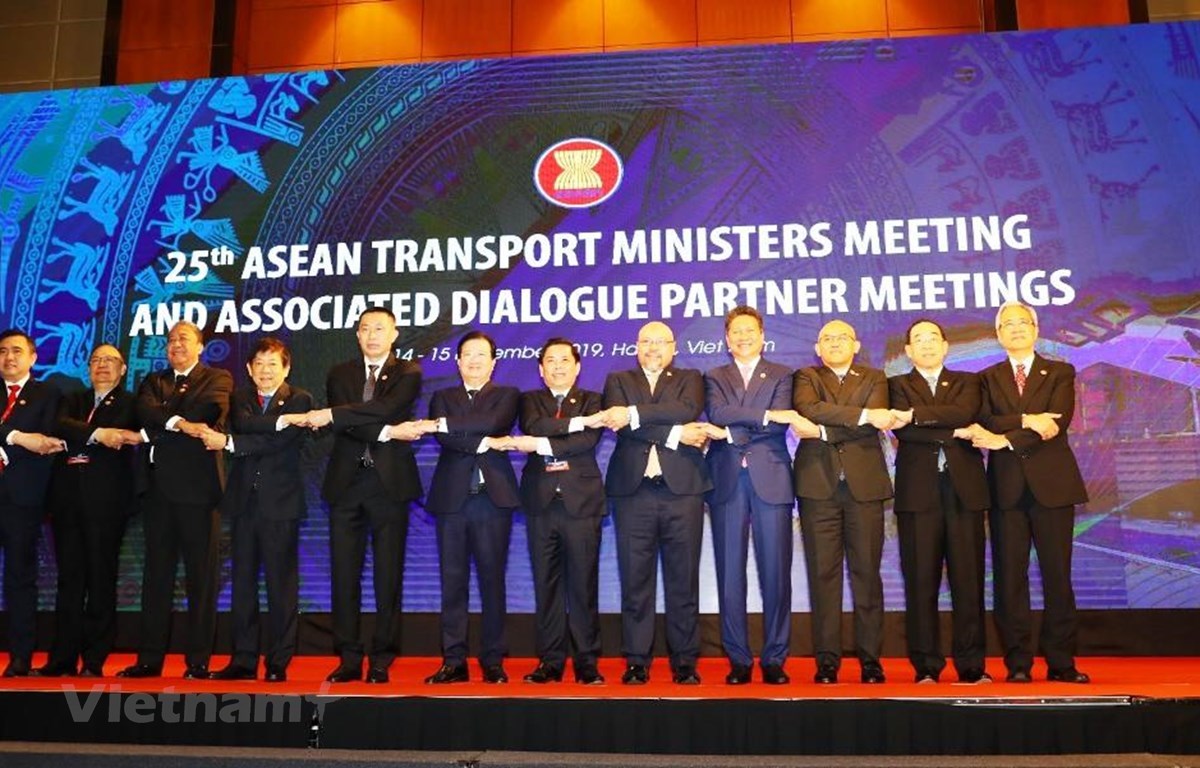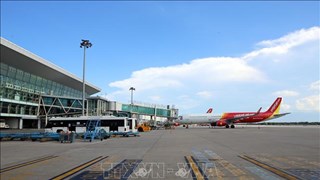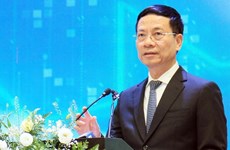ASEAN to strengthen transport connectivity
ASEAN members will enhance cooperation, improve their economies’ competitiveness and foster transport connectivity so as to build a well-connected and prosperous community.

Deputy Prime Minister Trinh Dinh Dung (sixth, left) and ASEAN transport ministers pose for a photo at the meeting in Hanoi on November 14 (Photo: VietnamPlus)
Hanoi (VNA) – Members of the Associations of Southeast Asian Nations (ASEAN) will enhance cooperation, improve their economies’ competitiveness and foster transport connectivity so as to build a well-connected and prosperous community.
Regional officials gathered at the 25th ASEAN Transport Ministers’ Meeting (ATM) and associated meetings with dialogue partners, which kicked off in Hanoi on November 14 with the participation of about 250 Vietnamese and foreign delegates.
Addressing the event, Vietnamese Deputy Prime Minister Trinh Dinh Dung said the bloc has become one of the most successful regional organisations in the world. More than five decades since its establishment, ASEAN now has a combined population of over 640 million and an economy worth nearly 3 trillion USD in 2018, becoming the third biggest economy in Asia and the sixth largest in the world.
After five years of implementing the ASEAN Community Vision 2025, the bloc has continued to be strongly cohesive, affirmed its central role in maintaining peace, stability and development in Southeast Asia, and had close relations with many major partners around the globe.
He noted its member countries are striving to build the ASEAN Economic Community. In that process, the association always considers connectivity and integration as part of the top priorities in building the community so as to capitalise on the advantages of a dynamic and potential region. To achieve this, enhancing transport connectivity is of critical importance.
[ASEAN senior transport officials meet in Hanoi]
Over the past years, transport cooperation among member countries has continually been enhanced to support connectivity among them, helping to achieve a well-connected ASEAN, Dung added.
He went on to say that Vietnam, with a favourable location on transport routes linking Southeast Asia, Northeast Asia and other regions in the Asia-Pacific, always considers developing synchronous and modern infrastructure, especially transport and urban infrastructure, as one of the three strategic breakthroughs, which also include institutional completion and development of high-quality human resources.
Therefore, it has issued many policies to mobilise domestic and foreign resources for developing expressway, waterways and aviation infrastructure, which has given a facelift to the country’s transport system and enhanced links among its regions, as well as between Vietnam and the world.
The development of transport infrastructure has helped restructure the transport sector and harmoniously connect means of transport, thus reducing transport expenses and improve the efficiency and quality of transport infrastructure. That has subsequently helped promote the Vietnamese economy’s competitiveness, according to the Deputy PM.
In the speech, he also asked ASEAN transport ministers to push on with the implementation of cooperation initiatives and measures on all modes of transport, from air, sea to road, along with the signed agreements so as to work towards a barrier-free and borderless ASEAN.
Additionally, the countries should also bolster connectivity with the world through cooperation deals with partners like carrying out the ASEAN-China Air Transport Agreement, and negotiating and signing air services agreements with Japan, the Republic of Korea, New Zealand and the US, Dung noted.
The official added in 2020, Vietnam will mark 25 years of its ASEAN membership and hold the bloc’s chairmanship. As the ASEAN Chair, it pledges to continue making substantive contributions to the building and development of a cohesive and responsive ASEAN Community towards an ASEAN of peace, stability and prosperity.
According to the Vietnamese Ministry of Transport, this year’s ATM and associated meetings, scheduled to last through November 15, will focus on the completion of procedures for signing governmental-level multilateral documents to strengthen transport connectivity in ASEAN and between ASEAN and the partner countries of Japan, the Republic of Korea and China.
They will listen to reports on the implementation of programmes and projects within the framework of the Kuala Lumpur Transport Strategic Plan for 2016-2025. They will also approve projects, plans and programmes on ASEAN transport cooperation for 2020.
Besides, the member countries will discuss ways to bolster transport links, especially in aviation, with dialogue partners, namely China, Japan, the Republic of Korea, the European Union and the US-ASEAN Business Council.
Earlier, the 48th Senior Transport Officials’ Meeting and related meetings took place in Hanoi from November 11 to 13.
Founded in 1967, ASEAN comprises 10 member states, namely Brunei, Cambodia, Indonesia, Laos, Malaysia, Myanmar, the Philippines, Singapore, Thailand and Vietnam./.
Regional officials gathered at the 25th ASEAN Transport Ministers’ Meeting (ATM) and associated meetings with dialogue partners, which kicked off in Hanoi on November 14 with the participation of about 250 Vietnamese and foreign delegates.
Addressing the event, Vietnamese Deputy Prime Minister Trinh Dinh Dung said the bloc has become one of the most successful regional organisations in the world. More than five decades since its establishment, ASEAN now has a combined population of over 640 million and an economy worth nearly 3 trillion USD in 2018, becoming the third biggest economy in Asia and the sixth largest in the world.
After five years of implementing the ASEAN Community Vision 2025, the bloc has continued to be strongly cohesive, affirmed its central role in maintaining peace, stability and development in Southeast Asia, and had close relations with many major partners around the globe.
He noted its member countries are striving to build the ASEAN Economic Community. In that process, the association always considers connectivity and integration as part of the top priorities in building the community so as to capitalise on the advantages of a dynamic and potential region. To achieve this, enhancing transport connectivity is of critical importance.
[ASEAN senior transport officials meet in Hanoi]
Over the past years, transport cooperation among member countries has continually been enhanced to support connectivity among them, helping to achieve a well-connected ASEAN, Dung added.
He went on to say that Vietnam, with a favourable location on transport routes linking Southeast Asia, Northeast Asia and other regions in the Asia-Pacific, always considers developing synchronous and modern infrastructure, especially transport and urban infrastructure, as one of the three strategic breakthroughs, which also include institutional completion and development of high-quality human resources.
Therefore, it has issued many policies to mobilise domestic and foreign resources for developing expressway, waterways and aviation infrastructure, which has given a facelift to the country’s transport system and enhanced links among its regions, as well as between Vietnam and the world.
The development of transport infrastructure has helped restructure the transport sector and harmoniously connect means of transport, thus reducing transport expenses and improve the efficiency and quality of transport infrastructure. That has subsequently helped promote the Vietnamese economy’s competitiveness, according to the Deputy PM.
In the speech, he also asked ASEAN transport ministers to push on with the implementation of cooperation initiatives and measures on all modes of transport, from air, sea to road, along with the signed agreements so as to work towards a barrier-free and borderless ASEAN.
Additionally, the countries should also bolster connectivity with the world through cooperation deals with partners like carrying out the ASEAN-China Air Transport Agreement, and negotiating and signing air services agreements with Japan, the Republic of Korea, New Zealand and the US, Dung noted.
The official added in 2020, Vietnam will mark 25 years of its ASEAN membership and hold the bloc’s chairmanship. As the ASEAN Chair, it pledges to continue making substantive contributions to the building and development of a cohesive and responsive ASEAN Community towards an ASEAN of peace, stability and prosperity.
According to the Vietnamese Ministry of Transport, this year’s ATM and associated meetings, scheduled to last through November 15, will focus on the completion of procedures for signing governmental-level multilateral documents to strengthen transport connectivity in ASEAN and between ASEAN and the partner countries of Japan, the Republic of Korea and China.
They will listen to reports on the implementation of programmes and projects within the framework of the Kuala Lumpur Transport Strategic Plan for 2016-2025. They will also approve projects, plans and programmes on ASEAN transport cooperation for 2020.
Besides, the member countries will discuss ways to bolster transport links, especially in aviation, with dialogue partners, namely China, Japan, the Republic of Korea, the European Union and the US-ASEAN Business Council.
Earlier, the 48th Senior Transport Officials’ Meeting and related meetings took place in Hanoi from November 11 to 13.
Founded in 1967, ASEAN comprises 10 member states, namely Brunei, Cambodia, Indonesia, Laos, Malaysia, Myanmar, the Philippines, Singapore, Thailand and Vietnam./.












